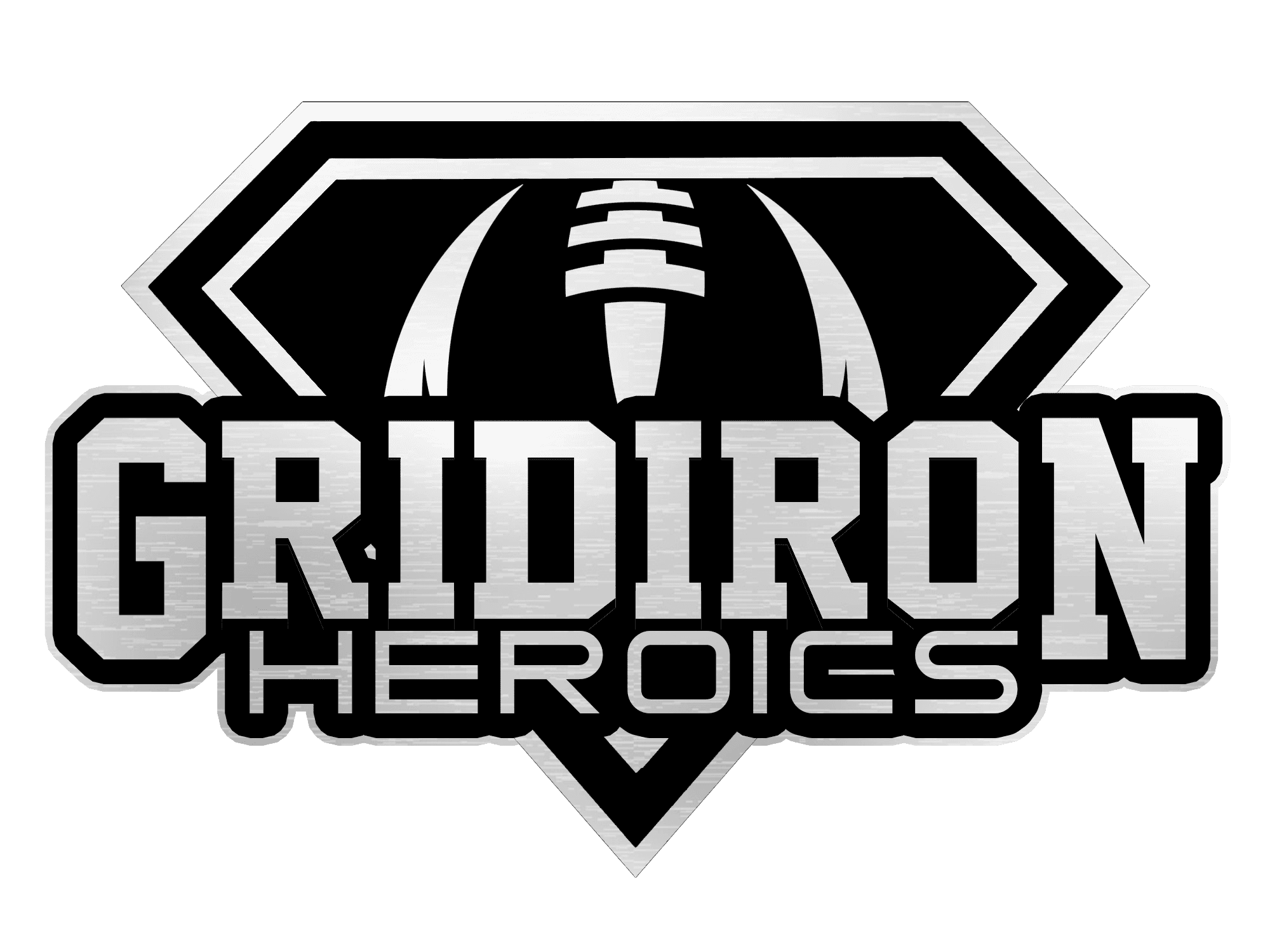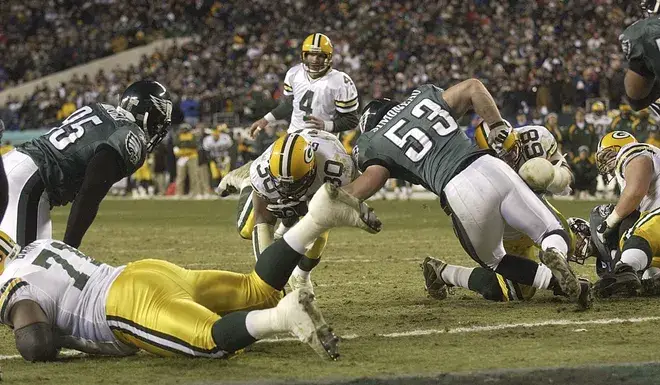As two of the longest-standing and most proud franchises in the NFL, it is safe to say the Green Bay Packers and the Philadelphia Eagles have seen and experienced much drama, both thrilling successes and depressing tragedies, during their lifespans, especially in the postseason,
However, the two teams’ playoff paths have not crossed much at all over their respective histories; the Packers, born in 1919, and the Eagles, who began business in 1933, have only met three previous times in the NFL’s post-season tournament.
Sunday’s wild-card round contest will mark the fourth installment of that playoff series, and, like the previous three, this game will be held on Philadelphia’s home turf.
Their first-ever post-season meeting was the 1960 NFL Championship game. This was Green Bay Packers coach Vince Lombardi‘s debut in the playoffs, and the Eagles edged his squad 17-13. Afterward, Lombardi famously told his players that any of his teams would never lose another championship game, and his prophetic words proved true.
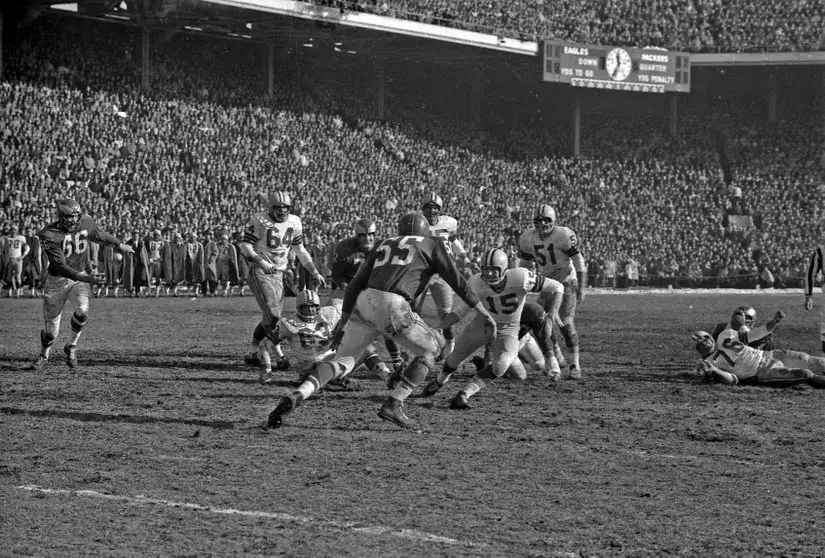
S. Niels Lauritzen / Milwaukee Journal Sentinel
The only Packer win over the Eagles in the playoffs was their 21-16 wild-card round victory to begin their magical 2010 post-season run that culminated with a victory in Super Bowl XLV over the Pittsburgh Steelers.
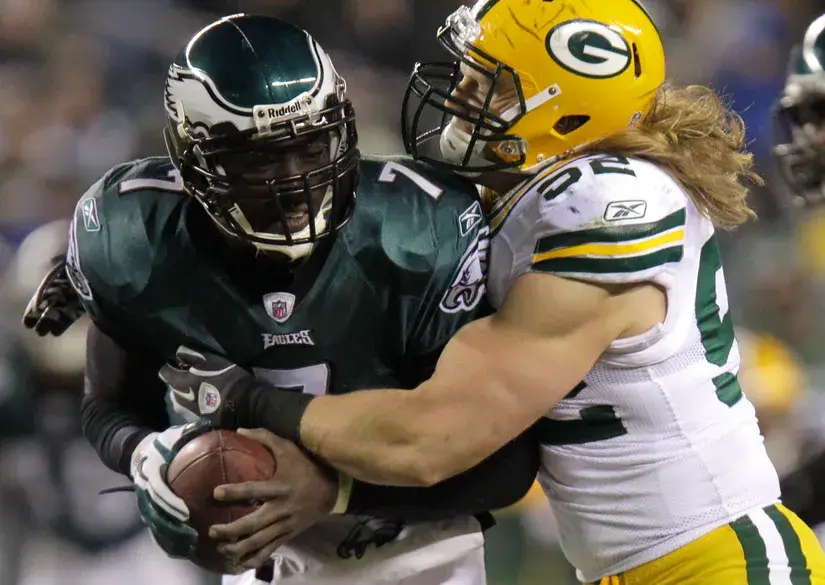
Mark Hoffman / Milwaukee Journal Sentinel
In between those two match-ups was a 2003 divisional-round tussle held on January 11, 2004, at Philadelphia’s Lincoln Financial Field. Although the game was held almost 21 years ago, Green Bay Packers fans would say the memory of it makes them nauseous and bitter still today.
Culmination Of A Crazy Four Weeks For The Green Bay Packers
The fashion in which the 2024 playoff game between the Green Bay Packers and the Philadelphia Eagles ended was historically unique and iconic, but it bears remembering just how surreal the three weeks preceding that game actually were:
- Needing wins in their final two games–and requiring some outside help–the Packers were set to face the Oakland Raiders on December 22, 2003, for Monday Night Football. However, quarterback Brett Favre lost his father, Irv, to a heart attack a day before, setting a pall over the team. In one of the most remarkable feats of his career, Favre, determined to play for his father’s memory, threw for 399 yards and four touchdowns in a 41-7 thrashing of the Raiders and kept their playoff hopes alive.

Paul Sakuma, AP
- After dispatching the Broncos, 31-3, in their finale, the Packers huddled around television sets to watch the late game between the Minnesota Vikings and the Arizona Cardinals. A Vikings win meant no playoffs for the Packers, and the game went down to the last play. The Cardinals’ Nate Poole caught an acrobatic touchdown pass with no time remaining to give Arizona an 18-17 win and vaulted the Packers into the post-season tournament.

- In the wild-card round, the Seattle Seahawks visited Lambeau Field, and after 60 minutes of regulation, the game was knotted up at 27. Then, Seattle quarterback Matt Hasselbeck memorably told a national audience after winning the overtime coin toss that the Seahawks “want the ball and we’re gonna score.” Hasselbeck threw an ill-advised comeback route that was intercepted by Packers’ cornerback Al Harris, who returned it 52 yards for a game-winning sudden-death touchdown and secured Green Bay’s trip to Philadelphia the following week.

Dan Powers
All of this craziness led to January 11, 2024, but the lunacy was far from over.
January 11, 2024: Philadelphia Eagles 20, Green Bay Packers 17 (OT)

Following a bye week, the rested Philadelphia Eagles welcomed the Green Bay Packers to town for a divisional playoff game. But after the first 15 minutes, the Packers looked like the more fresh and relaxed team.
Both teams began the game with two punts, then on Philadelphia’s third possession, Green Bay linebacker Nick Barnett recovered Eagles’ quarterback Donovan McNabb‘s fumble on the Philadelphia 40. On the very next play, Favre hit Robert Ferguson on a 40-yard touchdown strike to draw first blood, 7-0.
On their ensuing drive, the Eagles drove 42 yards to the Packers’ 14, but David Akers missed a 33-yard field goal attempt to put some points on the board. Green Bay promptly drove 77 yards in eight plays that ended with another Favre-to-Ferguson score, this time covering 17 yards, and the Packers led 14-0 with 1:31 remaining in the opening quarter.
The Eagles finally broke into the end zone with 6:32 left in the first half when McNabb found Duce Staley for a six-yard touchdown pass, cutting the Packers’ lead to 14-7, which stood as the two teams headed to the locker rooms for halftime.
In the third quarter, the Packers were forced to punt twice, and after the second one pinned Philadelphia on their own 11, the Eagles drove 89 yards in eight plays. McNabb hit Todd Pinkston for a 12-yard score on the first play of the fourth quarter, and just like that, the game was tied, 14-14.
After a Ryan Longwell field goal with 10:45 remaining forged the Packers into the lead, Green Bay head coach Mike Sherman called upon his defense to save the game and propel them into the NFC Championship Game.
Except for one play, the Packers’ defenders did just that. Unfortunately, that one play made all the difference.
4th and 26
Green Bay Packers fans know certain footnotes in their team’s history by certain colloquial terms. “The Ice Bowl” evokes vivid happy memories, just as the “Brandon Bostick Game” summons pangs of horror and bitter disappointment.
Enter the “4th and 26” game.
The Eagles took over at their own 20 with 2:21 remaining. Staley rushed 22 yards on the drive’s first play, landing Philadelphia at their 42 at the two-minute warning.
After an incomplete pass on first down, McNabb was sacked by Bhawoh Jue for a 16-yard loss all the way back to the 26-yard line. Another incompletion on third down set up the Packers’ defense to repel one last desperate play to advance in the playoffs.
Earlier this week, The Milwaukee Journal Sentinel writer JR Radcliffe also revisited the fateful play. The article hinted at the fact that more than a few players and coaches were equally culpable for the fateful play.
Radcliffe wrote: “The Packers set up a four-man deep zone with Al Harris and Mike McKenzie outside and Darren Sharper and Marques Anderson inside. Linebacker Nick Barnett and nickelbacks Michael Hawthorne and Bhawoh Jue were underneath.”
In other words, there were Packer defenders everywhere except where they actually needed to be to make a play.
McNabb stepped back, allowed his receivers time to run their routes, and hit Freddie Mitchell across the middle for a 28-yard gain, thereby extending the drive. The Eagles were able to eke out a 37-yard field goal with 10 seconds remaining to send the game into overtime.

Mark Hoffman/Milwaukee Journal Sentinel
The Eagles went three-and-out on the first possession of the extra session, but the Packers turned the ball right over on their first–and only–play of overtime when Favre was picked off by Brian Dawkins, who returned it 35 yards to the Packers’ 34-yard line.
From there, Philadelphia was able to gain enough yards for Akers to attempt a much easier field goal, and his 31-yarder sent the Packers home for the season.
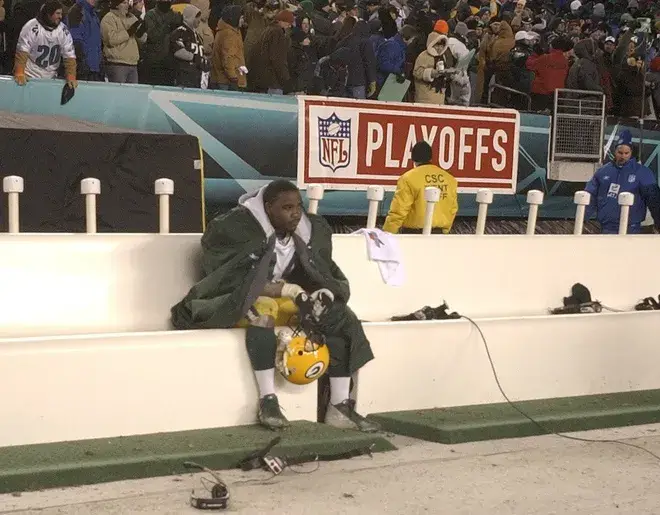
Benny Sieu
After the fact, Packers’ defensive coordinator Ed Donatell explained that his proposed defense should have worked.
Radcliffe recounted: “We were in ‘quarters’ coverage,” defensive coordinator Ed Donatell said. “The guy (McNabb) stepped up and needled the seam. Shouldn’t happen. We had a defense designed to stop that. Our underneath people can play deeper in that situation and our four-deep guys need to make a play.
“I just don’t like the result,” added Donatell, who defended his call. “It’s a call I’d like to execute in the future. It’s a necessary part of a lot of football games. It’s a coverage we count on. We just didn’t execute it.”
Barnett has often been tagged with the blame for the broken play, though he wasn’t downfield covering Mitchell. Barnett’s mistake was abandoning a gap that created a throwing lane for McNabb to drill a pass over the middle.
According to Radcliffe’s account: “Instead of dropping back into the middle of the field, Barnett stayed shallow to chase the tight end, who went in motion and then reversed back. While the tight end wasn’t a throw to get to the sticks for a first down and would have had to bypass several other tacklers to make it happen, McNabb’s throw went right through the seam evacuated by Barnett.”
Radcliffe continued: “Hawthorne didn’t force Mitchell to adjust his route and failed to get enough depth in the coverage so that he could make a play on the ball. Sharper and Anderson both were playing behind the first-down marker so that when the ball was thrown in front of them, they were too late to stop Mitchell from getting a first down.”
Barnett took the high road when asked about his participation in the play.
“It wasn’t like I was unfairly blamed, but there are a lot of other fingers to point,” Barnett said a few days after the play. “Me, I’m not going to point fingers at anybody but myself and to say I could have been in a better position. But there are a lot of other things that could have been, should have been and didn’t (happen).
“I take credit for that. Hopefully, one day I’ll be a leader for this team and as a leader you have to take credit for things like that. That shouldn’t have happened.”
